Optimal Times to Feed Tropical Fish: As a tropical fish owner, you want to ensure that your fish are healthy and happy. One way to achieve this is by feeding them on a schedule that meets their dietary needs.
Knowing when to feed your tropical fish is essential for their overall well-being. In this article, I will provide a feeding guide to help you establish a feeding schedule and choose the best times to nourish your fish.
Proper feeding of your tropical fish can prevent overfeeding or underfeeding and promote a healthy diet. By following this guide, you can ensure the longevity and vitality of your fish.
Key Takeaways:
- Feeding your tropical fish on a consistent schedule is important for their health.
- Knowing the dietary needs of your fish can help you choose the right type of food and feeding frequency.
- Monitoring your fish’s feeding behavior can help you detect any issues with their appetite or health.
- Adjusting the feeding schedule for specialized fish, such as nocturnal species or herbivores, can support their nutritional needs.
- Maintaining a well-balanced feeding routine can keep your fish happy and healthy.
Table of Contents
Optimal Feeding Schedule for Tropical Fish: The Importance of Feeding Schedule for Tropical Fish
As a tropical fish owner, establishing a proper feeding schedule is crucial for maintaining the health and vitality of your beloved aquatic pets. A consistent feeding routine ensures that your fish receive the necessary nutrients throughout the day, supporting their well-being.
So, how often should you feed your tropical fish? This largely depends on the size, age, and species of fish you have in your aquarium. As a general rule of thumb, it’s recommended to feed adult fish twice a day, while younger and smaller fish may require more frequent feedings. However, it is important not to overfeed your fish, as this can lead to health problems.
- Observe your fish’s behavior and adjust the feeding schedule if necessary.
- Only feed your fish the recommended serving size to prevent overfeeding.
- Vary their diet with a combination of quality fish flakes, pellets, and frozen or live food to meet their nutritional needs.
- Remove any uneaten food from the aquarium after a few minutes to prevent water contamination and maintain water quality.
By following these feeding tips and establishing a suitable feeding routine, you can ensure the optimal health and happiness of your tropical fish.
Understanding the Dietary Needs of Tropical Fish
When it comes to feeding tropical fish, there is no one-size-fits-all solution. Different species have different dietary needs that should be catered to. Ensuring that you are providing your fish with the right type of food is crucial for their overall health and well-being.
The following are some of the types of food that are suitable for tropical fish:
| Food Type | Description |
|---|---|
| Commercially available fish flakes and pellets | These are the most commonly used foods for tropical fish. They are available in a wide range of brands, with varying nutritional values catered to the needs of different species. |
| Live or frozen foods | These are ideal for larger fish as they require more substantial meals. Some examples of live or frozen foods are brine shrimp, bloodworms, and krill. |
| Veggies or algae-based foods | These are ideal for herbivorous species such as plecos or clownfish. They help provide necessary vitamins, minerals, and fiber. |
It’s important to research your specific fish species to understand their nutritional requirements. Consult with a veterinarian or a pet store representative to determine the ideal diet for your fish.
Tip: Avoid overfeeding your fish as this can cause health problems such as constipation, organ failure and can lead to an overgrowth of harmful bacteria in the tank. Only feed them the amount they can consume in a couple of minutes.
Factors to Consider When Determining Feeding Frequency
Feeding frequency is one of the most critical factors to consider when it comes to keeping tropical fish healthy and happy. The frequency of feeding your fish can impact their overall growth, immune system, and mood. The frequency varies depending on multiple factors such as size, age, and species.
One factor you should consider is the size of your fish. Smaller fish have faster metabolisms and require more frequent feedings to maintain their energy levels. On the other hand, larger fish have a slower metabolic rate and can go longer between feedings.
Age is another factor that should be considered when determining feeding frequency for your tropical fish. Juvenile fish require more frequent feedings than adult fish because they are still growing and need the extra nutrients to support their development.
Species also play a vital role in feeding frequency. Different fish have varying needs and digestive abilities. For example, herbivorous species require more frequent feedings with smaller portions compared to carnivorous species that require larger, less frequent feedings.
To help you determine the ideal feeding frequency for your tropical fish, it’s essential to consider all these factors. A proper feeding schedule will ensure that your fish stay healthy, active, and happy.
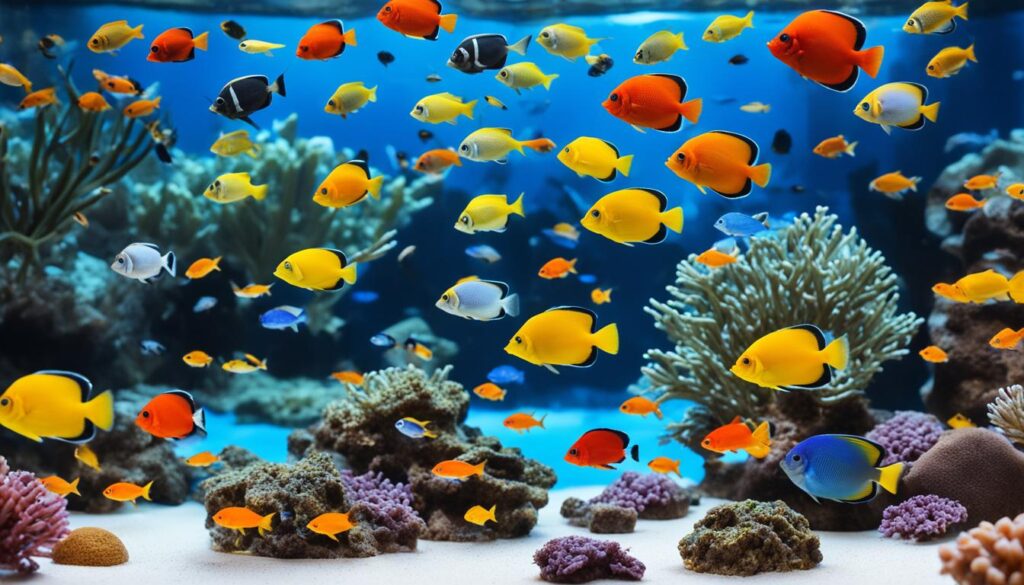
Proper Feeding Frequency Table
| Fish Species | Feeding Frequency |
|---|---|
| Goldfish | 1-2 times daily |
| Betta fish | 2-3 times weekly |
| Tetras | 2-3 times daily |
| Arowanas | 1-2 times daily |
| Angelfish | 2-3 times daily |
| Discus fish | 3-4 times daily |
Remember, this table is only a general guideline, and your fish may require more or less feeding, depending on their individual needs.
Morning Feeding: Advantages and Considerations
Feeding your tropical fish in the morning can be a great way to start their day off right. Not only is it often considered an optimal feeding time for tropical fish, but it also has several advantages that can benefit your fish and their overall health.
One major advantage of feeding your tropical fish in the morning is that it aligns with their natural feeding patterns. Many tropical fish are active during the day and tend to be most hungry in the morning hours. By providing them with a meal in the morning, you can help them feel satiated and energized throughout the day.
Another benefit of morning feedings is that they can help prevent overfeeding. When you feed your fish later in the day, there is a greater risk of overfeeding since they may not have had time to digest their earlier meal. By starting the day with a moderate feeding, you can help maintain a healthy eating routine for your fish.
However, there are also considerations to keep in mind when feeding your tropical fish in the morning. For example, if you have a busy schedule and can’t consistently feed your fish in the morning, it may be better to establish a different feeding routine. Additionally, if you have fish species that are nocturnal or more active at night, morning feedings may not align with their natural behaviors.
Overall, feeding your tropical fish in the morning can be a great way to support their health and well-being. Be sure to monitor your fish’s feeding behavior and adjust your feeding routine as needed to ensure an optimal schedule for your fish.
Afternoon Feeding: Benefits and Considerations
Feeding your tropical fish in the afternoon can be advantageous for several reasons. One of the main benefits is that it allows your fish to have a meal before the evening, which is when they tend to slow down and become less active.
Another consideration is that feeding your fish in the afternoon can help break up their feeding routine, which can reduce the risk of overfeeding. Providing small meals at different times throughout the day can also mimic their natural feeding habits in the wild.
It’s important to note that the optimal feeding times for tropical fish can vary depending on the individual species, size of the fish, and the overall feeding schedule. Be sure to monitor your fish’s behavior and adjust the feeding schedule accordingly.
Additionally, it’s crucial to avoid feeding your fish too close to bedtime, as this can lead to uneaten food settling at the bottom of the tank and polluting the water. As with all feeding times, moderation is the key to maintaining a healthy feeding routine.
I have found that feeding my fish in the afternoon not only encourages them to eat but also keeps their metabolism strong throughout the day.” – Mark Johnson, tropical fish owner
Evening Feeding: Pros and Cons
Feeding your tropical fish in the evening is a popular choice among fish owners. There are advantages and disadvantages to consider before deciding on an optimal feeding time.
Pros of Evening Feedings
- Relaxation: Watching your fish feed in the evening can be a calming and enjoyable experience.
- No interruptions: By the evening, household activities have usually quieted down, allowing you to focus on feeding without interruptions.
- Mimics natural environment: Many tropical fish are active feeders at dusk, which makes feeding them in the evening closer to their natural environment.
Cons of Evening Feedings
- Fish are less active: By evening, your fish may be less active, which could affect their appetite and desire to feed.
- May disturb sleep: Some fish are nocturnal, and feeding them in the evening could disrupt their sleep patterns, leading to health issues.
- Difficult to monitor: Feeding in the evening means you may not be able to observe your fish’s feeding behaviour and adjust their feeding schedule accordingly if needed.
Consider your specific tropical fish species and their feeding habits when deciding on an optimal feeding time. If you decide on feeding in the evening, ensure it does not interfere with their sleep schedule.
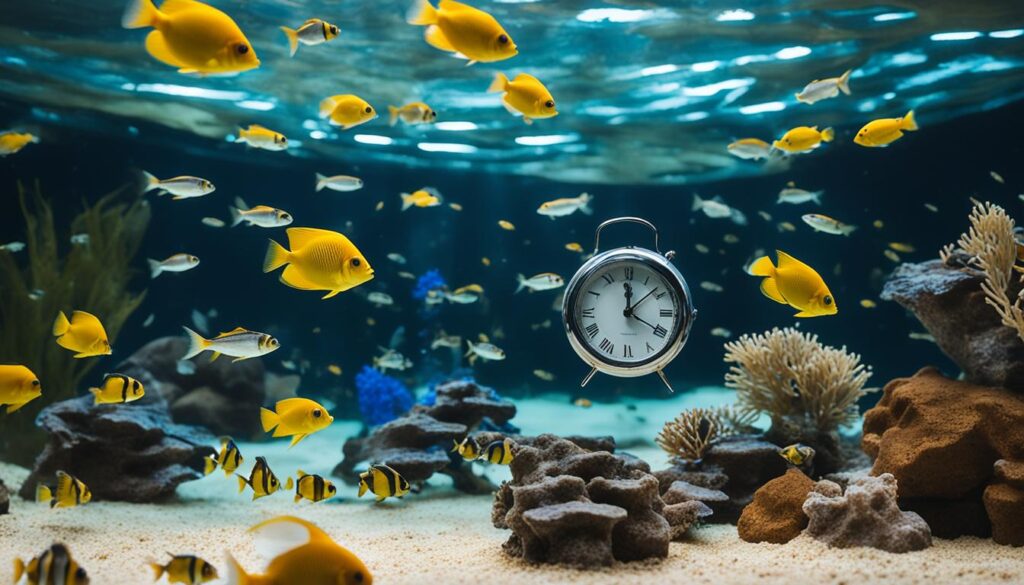
Balancing Feeding Times for a Healthy Routine
A balanced feeding routine is crucial for maintaining the health and well-being of your tropical fish. To promote a healthy eating routine, I suggest dividing your fish’s daily feeding amount into two or three smaller portions to avoid overfeeding or underfeeding. This approach also helps ensure that all fish receive an equal share of food.
When deciding on the optimal feeding times for tropical fish, consider their natural behavior and feeding patterns. In the morning, fish tend to be more active and hungry after a night’s rest, making it an ideal time to feed them. Afternoon feedings can also be beneficial, especially if you have nocturnal fish that become more active during the day.
It’s essential to spread out feeding times throughout the day, as opposed to feeding your fish once a day or in large quantities. Overfeeding can lead to health problems such as obesity and poor water quality. Underfeeding, on the other hand, can stunt fish growth and make them susceptible to diseases. Finding the right balance takes trial and error, so keep an eye on your fish’s behavior and adjust their feeding schedule accordingly.
When designing your feeding routine, be consistent and choose a schedule that works best for both you and your fish. Remember not to overfeed, keep the water clean, and monitor your fish’s feeding behavior regularly. With a balanced feeding routine, you can help ensure a healthy and thriving aquarium for your tropical fish.
Adjusting Feeding Schedule for Fish with Specific Needs
While most tropical fish can thrive on a regular feeding schedule, some species require specific dietary needs or feeding schedules to maintain their health. For example, nocturnal species often feed at night, so it’s important to adjust feeding times to align with their natural pattern of behavior. Additionally, herbivores may need to be fed more frequently to meet their higher nutritional needs.
When it comes to feeding specialized fish, it’s essential to do your research and understand their unique dietary requirements. Some fish may require live or frozen foods, while others may prefer pellets or flakes. Ensure you feed your fish the appropriate amount of food, as overfeeding can lead to health issues such as obesity and poor water quality.
To accommodate specialized feeding schedules, consider using timed feeders or adjusting the timing of meals throughout the day. Keeping a feeding log can also be helpful to ensure that each fish receives the appropriate amount of food at the right time.
Monitoring Your Fish’s Feeding Behavior
As a responsible fish owner, it’s essential to keep a close eye on your tropical fish’s feeding behavior. By doing so, you can detect any issues with their appetite or health early on. Here are a few things to observe when monitoring your fish’s feeding behavior:
- How much and how often your fish are eating
- Whether they are actively searching for food or avoid it altogether
- Signs of overfeeding or underfeeding
- Changes in appetite or feeding behavior
If you notice any significant changes in your fish’s feeding behavior, it may be time to adjust their feeding schedule. It’s also important to ensure that your fish are eating the appropriate amount of food, as overfeeding or underfeeding can lead to health problems.
Keep in mind that some fish are more aggressive eaters than others, and competing for food can lead to stress and aggression. It’s best to separate aggressive feeders during feeding time or spread out the feeding schedule to avoid any issues.
Monitoring your fish’s feeding behavior is a crucial part of maintaining a healthy feeding routine. By paying attention to your fish’s appetite and making adjustments when necessary, you can help ensure they remain happy and healthy.
Maintaining a Healthy Feeding Routine
Once you’ve established a regular feeding schedule and understand the dietary needs of your tropical fish, it’s essential to maintain consistency. Consistency is key to keeping your tropical fish healthy and happy. Here are a few practical tips to ensure your fish receive appropriate meals:
- Stick to a feeding routine that works for you and your fish. This routine should be consistent and provide appropriate meals for your fish.
- Do not overfeed your fish. Overfeeding can lead to health problems, including bloating and constipation. It’s essential to feed your fish the appropriate amount of food that meets their nutritional needs.
- Monitor your fish’s feeding behavior daily. If you notice any changes, such as lack of appetite or abnormal behavior, adjust their feeding schedule accordingly.
- Ensure that the food you are providing is fresh and of high quality. Do not feed your fish food that has expired or is spoiled.
- Consider offering your fish a variety of food options. Many tropical fish enjoy a mix of flakes, pellets, and live or frozen foods. Variety can help ensure that your fish receive the necessary nutrients for optimal health.
By maintaining a consistent feeding routine and monitoring your fish’s behavior, you can provide your tropical fish with the proper nutrition for their well-being.
Conclusion
As an avid tropical fish enthusiast, I know how important it is to provide your fish with the right type of food at the right time. By following the feeding guide outlined in this article, you can ensure that your fish receive the appropriate nutrition that they need to thrive.
Remember to establish a feeding schedule based on the size, age, and species of your tropical fish. Consider their specific dietary needs, and monitor their feeding behavior regularly to identify any potential issues. By doing so, you can maintain a healthy and happy aquarium for your fish.
Thank you for reading, and I hope that this article has been informative and helpful to you. Happy feeding!
FAQ
When is the best time to feed tropical fish?
The optimal times to feed tropical fish are in the morning and evening. These times align with their natural feeding habits in the wild.
How often should I feed my tropical fish?
It is recommended to feed your tropical fish 2-3 times a day. However, the specific feeding frequency may vary depending on the species and their nutritional needs.
What should I feed my tropical fish?
Tropical fish can be fed a variety of commercially available fish flakes or pellets that are specifically formulated for their nutritional requirements. Additionally, you can supplement their diet with live or frozen foods such as brine shrimp or bloodworms.
How do I determine the feeding frequency for my tropical fish?
Factors such as the size, age, and specific species of your tropical fish should be considered when determining the ideal feeding frequency. Younger fish and smaller species may require more frequent feedings, while larger fish may need to be fed less often.
What are the advantages of morning feedings for tropical fish?
Feeding your tropical fish in the morning can help simulate their natural feeding behavior and provide them with energy throughout the day. It also allows you to monitor their appetite and observe any potential health issues.
Are there any benefits to feeding my tropical fish in the afternoon?
Feeding your tropical fish in the afternoon can be beneficial as it gives them a mid-day boost of energy. Additionally, it can help establish a routine and provide stimulation during their active hours.
What are the pros and cons of evening feedings for tropical fish?
Feeding your tropical fish in the evening can mimic their natural foraging behavior and allow them to settle down for the night. However, it can also lead to uneaten food sinking to the bottom of the tank and affecting water quality.
How can I create a balanced feeding routine for my tropical fish?
To balance feeding times, it is recommended to split the total daily food portion into multiple smaller feedings throughout the day. This ensures that your fish receive a steady supply of nutrients without overfeeding.
How do I adjust the feeding schedule for tropical fish with specific needs?
Certain tropical fish species, such as nocturnal or herbivorous fish, may have unique feeding requirements. It is important to research their specific needs and adjust the feeding schedule accordingly to accommodate their natural behavior and dietary preferences.
What should I observe when monitoring my fish’s feeding behavior?
When feeding your tropical fish, observe their appetite, response to food, and any signs of abnormal behavior or health issues. Changes in feeding behavior can indicate stress, illness, or improper nutrition, and may require adjustments to the feeding schedule or diet.
How can I maintain a healthy feeding routine for my tropical fish?
To maintain a healthy feeding routine, ensure consistency in feeding times, portion sizes, and the type of food provided. Avoid overfeeding, as it can lead to poor water quality and health problems. Regularly monitor your fish’s condition and make adjustments as needed.
References
Federation of British Aquatic Societies (FBAS)
Federation of American Aquarium Societies (FAAS)
Please check other articles on this website, I have listed some of them here:
Everything You Need to Know About Caring for Blue Zebra Cichlids in Your Aquarium
Everything You Need to Know About Torch Coral: A Stunning Addition to Your Marine Aquarium
The Fascinating Penguin Tetra: Thayeria boehlkei (2023-24)
The Ultimate Guide to Scarlet Badis Care and Breeding
The Ultimate Bamboo Shrimp | Flower Shrimp Guide Which You Dont Want to Miss Out 2023
The Vibrant and Captivating Strawberry Peacock Cichlid: A Guide to Care and Maintenance
Electric Blue Acara: The Ultimate Guide To Care And Keeping
Best Fish for a 40 Gallon Tank: Top Choices for a Thriving Aquarium
Simple Guide to Easy-to-Care-for Aquarium Plants
Discover the Diverse Corydoras Catfish Varieties- A Guide
Get to Know Various Types of Algae Eaters
Master Guide: Best Water Parameters for Goldfish Care 2023-24
Mastering Black Ghost Knife Fish Care: A Comprehensive Guide
Optimal pH Levels for Tropical Fish: Essential Aquarium Guide
Discovering Freshwater Snail Species: An In-depth Guide
Expert Tips for Breeding Guppies: Keys to Successful Fishkeeping
Discover Peaceful Community Fish: Your Guide to Calm Aquatics
Ultimate Guide to Live Food for Betta Fish — Healthy Choices
Complete Guide to Your Perfect Cichlid Tank Setup
Your Guide to the Best Substrate for Planted Aquariums
Essential Guide to Discus Fish Care: Help Your Pets Thrive!
Grow Your Own Eden: Beginner-Friendly Aquascaping Plants Guide
Perfect Neon Tetra Tank Mates: Guide to Aquarium Harmony
Product Review of Eheim Classic vs Professional
The Ultimate Guide to Discus Fish Care
What Fish Can Live With Discus?
Ideal pH for Discus Fish | Aquarium Water Guide
How to Sex Discus Fish?: A Simple Guide for Hobbyists
Complete Discus Fish Tank Setup Guide
Can Discus Fish Live With Angelfish? The Complete Guide
Discus Diet Guide: What Do Discus Fish Eat?
Are Discus Fish Hard to Keep? Insights & Tips.
Optimal Discus Fish Water Parameters Guide
Discus Fish Size Guide 2024: How Big Do Discus Fish Get?
Ultimate Million Fish Guppy Care Guide 2024
Simple Guide to Easy-to-Care-for Aquarium Plants
Grow Your Own Eden: Beginner-Friendly Aquascaping Plants Guide
Hornwort Aquarium Plants: The Ultimate Guide to Care and Maintenance
Aquarium Equipment for Beginners: The Complete Checklist
Feeding Your Aquarium Fish: The Complete Guide
Common Beginner Fishkeeping Mistakes and How to Avoid Them!
Aquarium Plants for Beginners: Easy Care and Beautiful Options
Keeping Your Aquarium Water Clean and Healthy: The Complete Guide
Breeding Aquarium Fish: A Comprehensive Guide
Marine Aquariums: The Ultimate Challenge for Experienced Hobbyists
Tech in the Tank: Must-Have Gadgets for Aquarium Automation
Dwarf Sucking Catfish : The Ultimate Guide to Keeping and Caring for Oto Catfish
The Science of Aquarium Water Chemistry: Understanding pH, KH, and GH
Veiltail Goldfish: The Exquisite Beauty of Flowing Fins
Perfect Neon Tetra Tank Mates: Guide to Aquarium Harmony
Goldfish Care: Beyond the Bowl – Everything You Need to Know
Master Red Tail Shark Care: Tips, Tank Mates & Surprising Traits!
Sheepshead Wrasse Facts & Habitat Guide
Unveiling the Unique Asian Sheepshead Wrasse: A Fascinating Reef Fish with Quirky Behavior
Peacock Wrasse: A Dazzling Addition to Your Aquarium
Vibrant Wrasse Fish: Care Guide & Species Info
Bluestreak Cleaner Wrasse – Vibrant Reef Ally
Coris Wrasse Care Guide for Saltwater Aquariums
Melanurus Wrasse Care Guide & Habitat Tips
The Ultimate Guide to Kuhli Loach
The Ultimate Guide to Popular Loach Species for Freshwater Tanks
Yoyo Loach: The Ultimate Guide to This Fun and Friendly Fish
How to Care for Clown Loaches: The Ultimate Guide for Aquarium Lovers
I am a passionate aquarist with over 30 years of hands-on experience in fishkeeping. My journey began at a young age, collecting fish from the wild and learning through experimentation. Specializing in tropical fish, I bring a deep understanding of the hobby to FishKeepingMadeSimple. The site provides honest, detailed reviews of essential products and accessories to help fellow enthusiasts create the best environments for their fish.

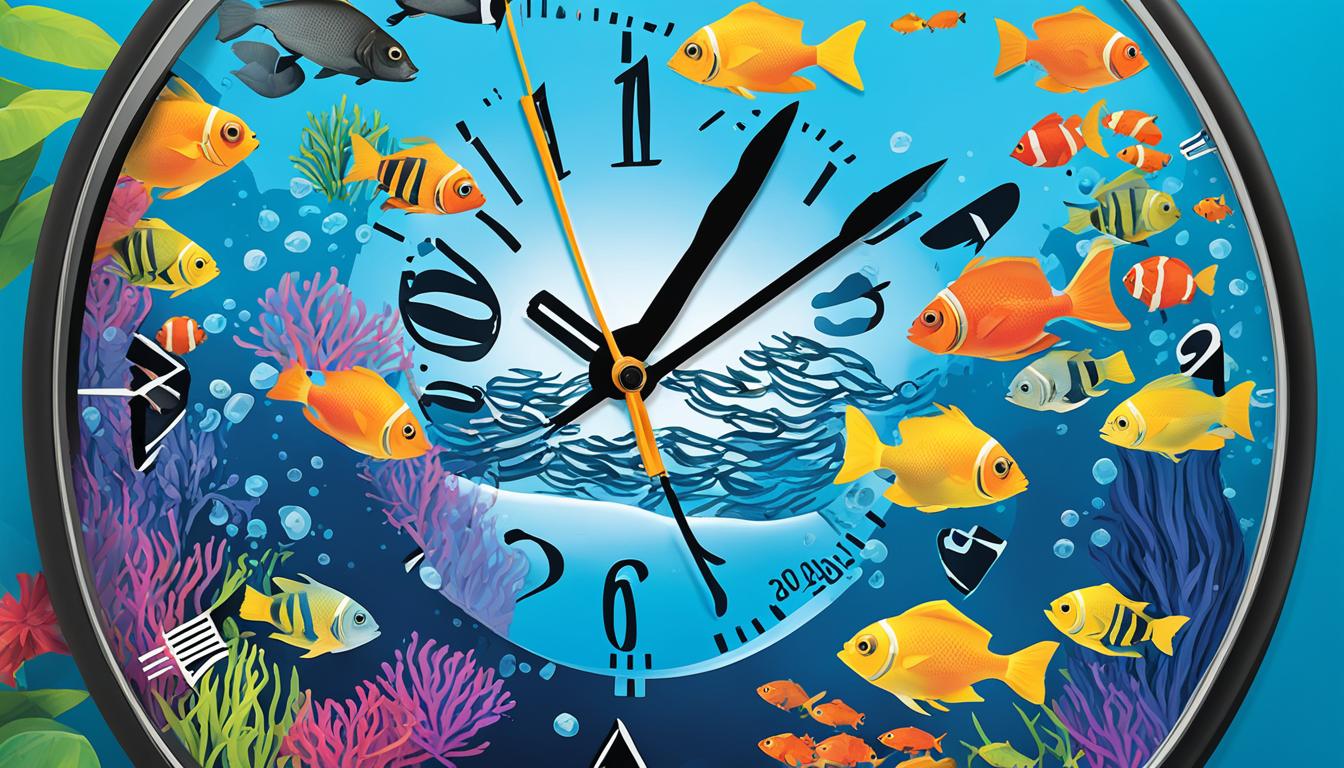

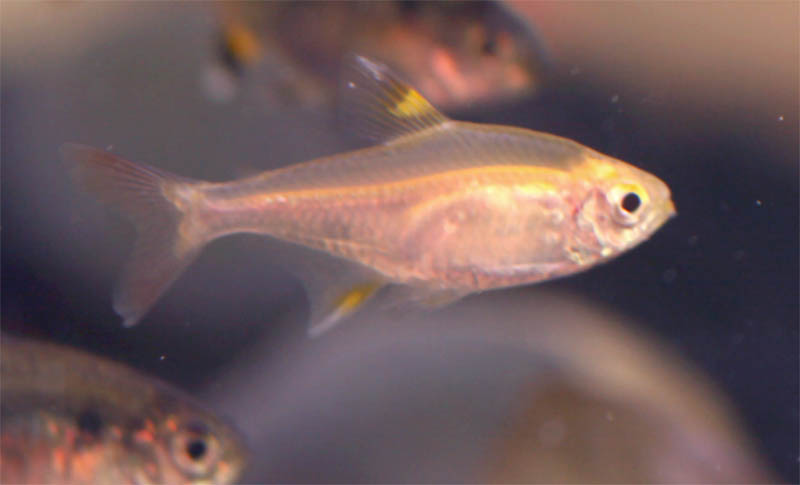
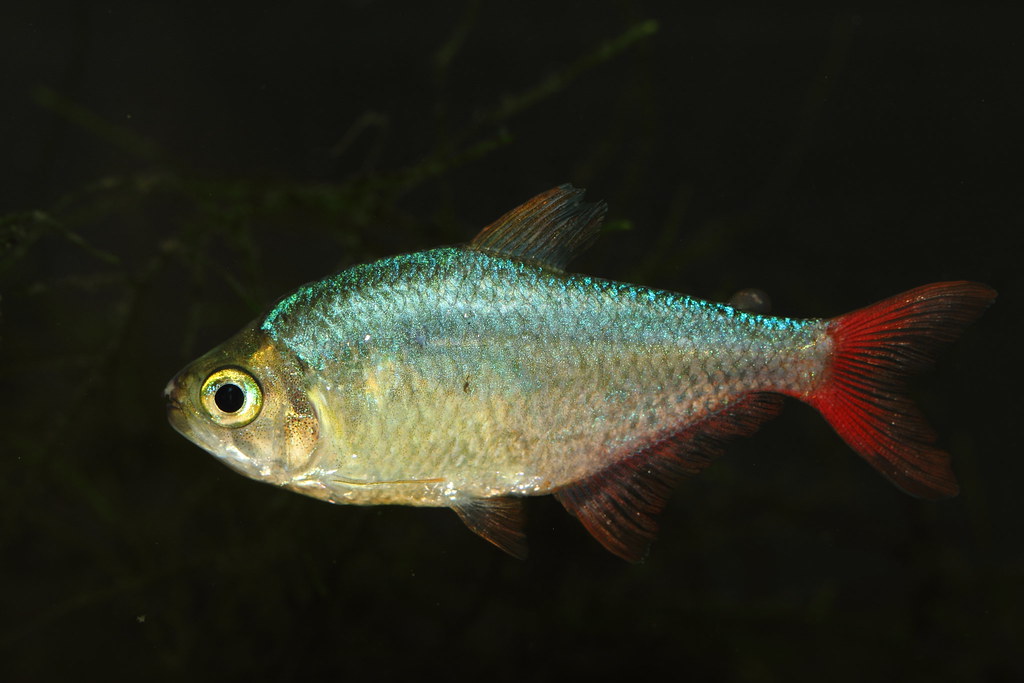
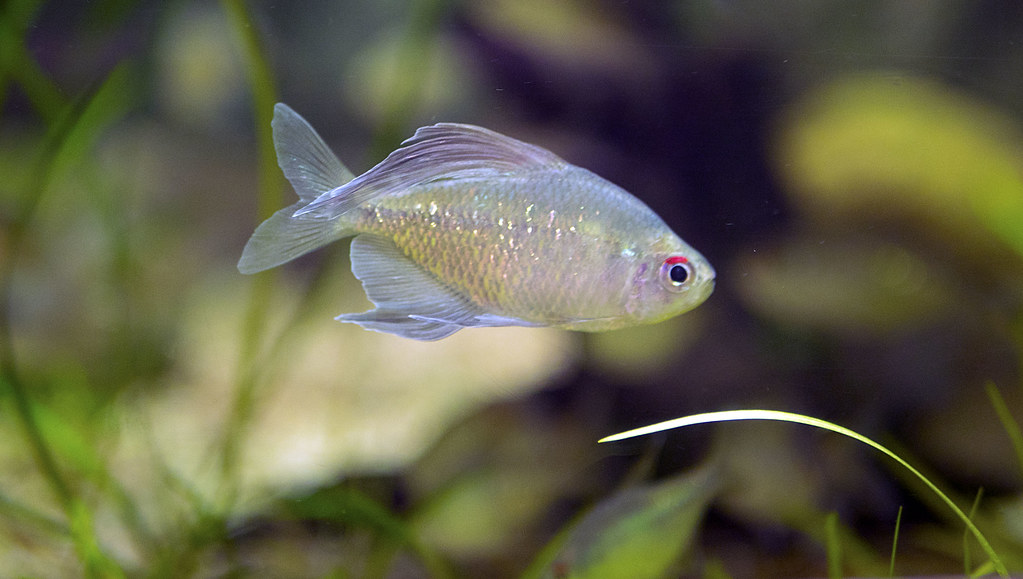
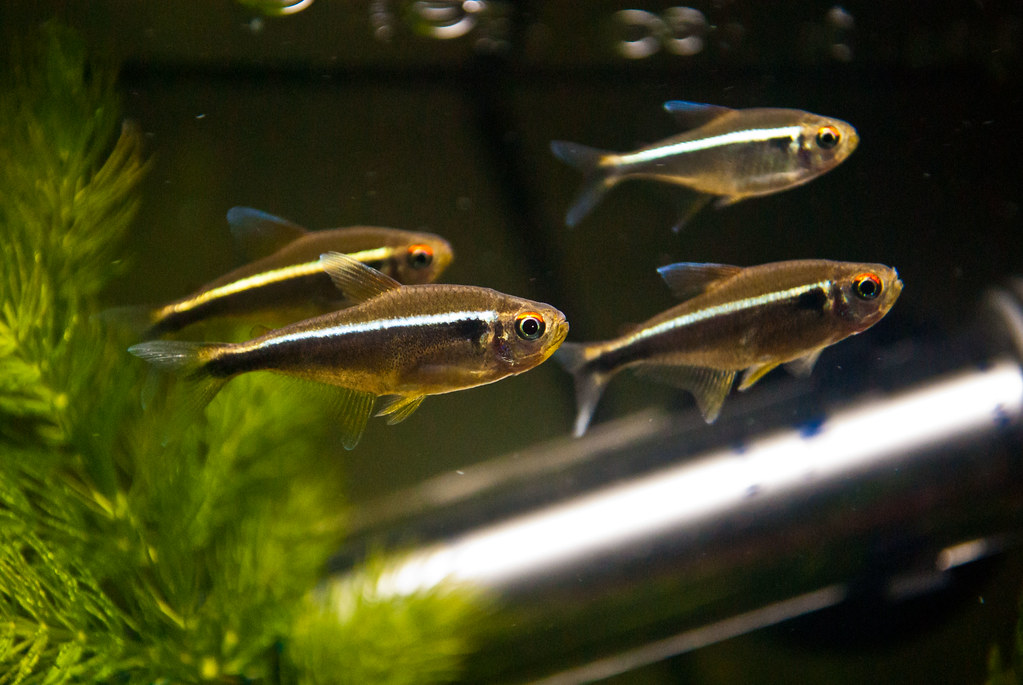
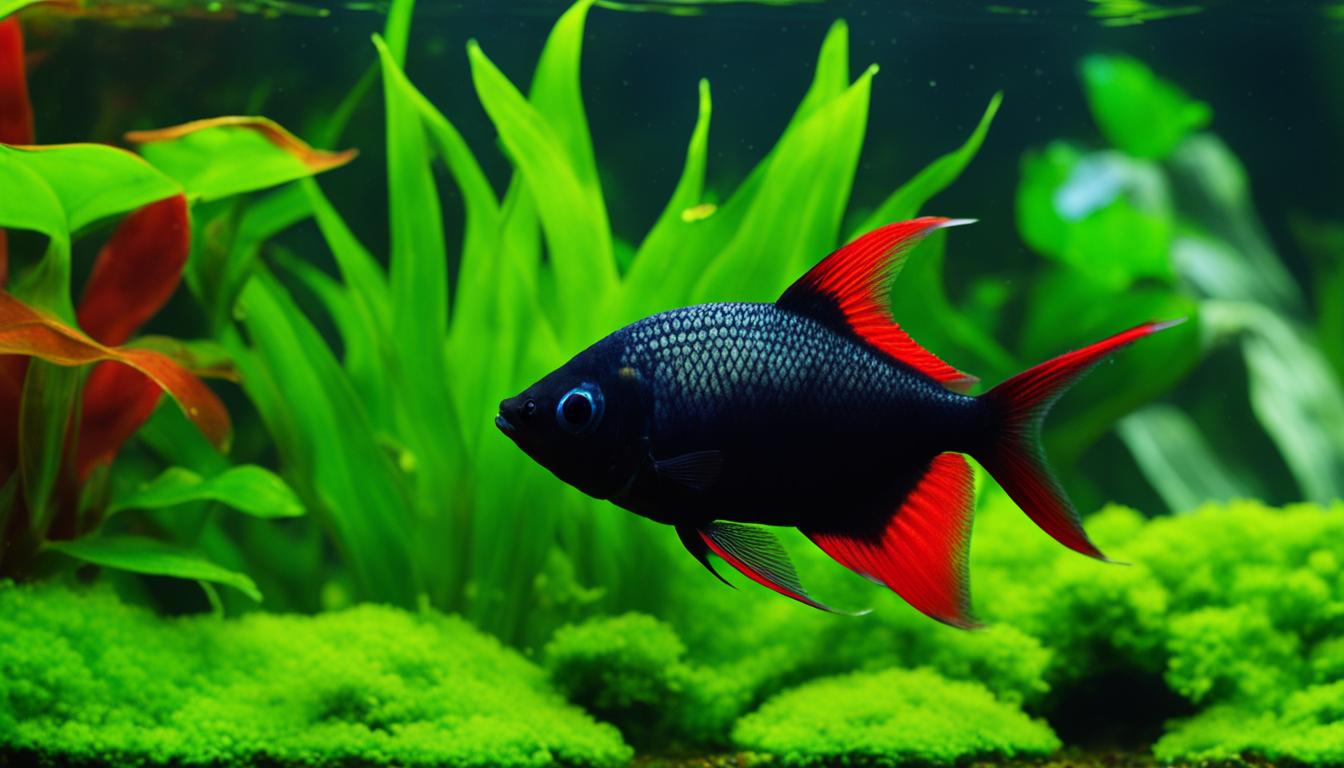


[…] High-quality flakes formulated for tropical fish, such as TetraMin, are a convenient and staple food for black neon tetras. These flakes are […]
[…] overfeeding the Vampire Pleco as it can lead to digestive issues and poor water quality. Stick to a feeding schedule and provide a balanced […]
[…] Tropical Fish […]
[…] a balanced diet: Offer a mix of high-quality flake or pellet food specifically formulated for tropical fish. Supplement their diet with live or frozen foods like brine shrimp, daphnia, or bloodworms to […]
[…] Optimal Times to Feed Tropical Fish Daily […]
[…] least twice a week until they can eat larger pellets. Remember, each tank is different, so adjust feeding schedules accordingly. Caridina shrimp can be picky, so be patient and watch their eating habits closely to […]